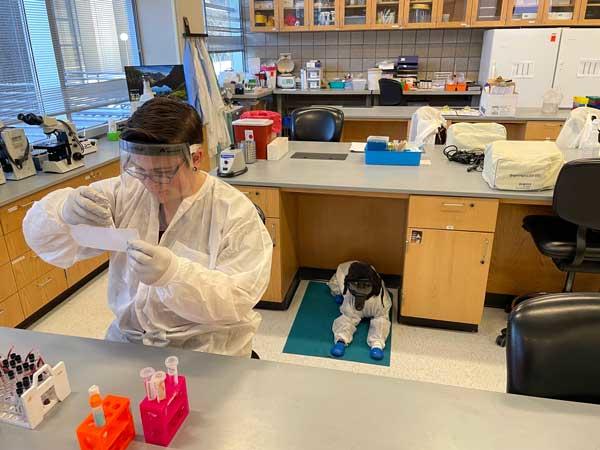
Author: Erin Wilson
Before finding their way to the College of Pharmacy, student Wesley Flint sought a middle ground between a love for chemistry and biology and an aspiration to work in the medical field. He first heard of medical laboratory sciences during orientation at a different university— described as “test tubes, petri dishes and turning people’s fluids into numbers for treatment.” Now a rising second-year MLS student, Flint has loved every class they’ve taken (except diagnostic microbiology, which scares him). But when applying for the program, Flint had doubts about his acceptance because of Nova, their service dog.
“When I applied for this, I didn’t know if they'd let me bring Nova in the lab. I'd do my best to advocate for myself, but that was a big question mark,” Flint said. “[The MLS program] made it really easy for me.”
He said MLS faculty were welcoming, respectful, and helpful every step of the way.
“I've had nothing but professionalism from them. When I went to my first lab class with [my course instructor] Hannah Gartzke, we had already done a bunch of planning beforehand and just rolled right into it,” they said. “I didn't have to run through all the laws with everybody and nobody was taken off guard; even though my comfort in this transition is important, it's also important for the professors to feel comfortable in their work environment.”
They also worked with Sohail Akhavein, a former consultant from the University of Minnesota’s Disability Resource Center (DRC), to coordinate accommodations for Nova.
“[Sohail] was a really good go-between between me and the professors and any of their concerns. The DRC here at the U of M has a different approach to things than what I'm used to, but I very much like it a lot,” Flint said. “They really want to take the burden off of us students so that we can focus on school and I think that that's something that's overlooked a lot of the time when accessibility is talked about.”
From previous courses in anatomy, physiology, and organic chemistry, Flint already had safety goggles and booties for Nova, but she needed more intensive protective gear for other topics, like hematology. MLS faculty helped research and craft a full neck-to-tail lab coat and found new, fluid-resistant boots for Nova to pair with her safety goggles, all of which she dutifully wears throughout Flint’s three-hour lab sessions.
According to faculty, Nova may very well be the first service dog in a health science learning lab— a spotlight that makes Flint nervous. He worries onlookers will question whether Nova is truly a service dog.
“I know that we're not a fake team, and I know that she performs tasks for my legitimate disabilities,” they said. “Having a service dog changes a lot of interactions. People don't see me as Wes, they see me as the guy with the dog, or they see Nova as the dog with the guy.”
But he also noted that service dog handlers “come from all walks of life,” and the world is beginning to recognize that service dogs are helpful for many different disabilities. A groundbreaking moment for Flint, who trained Nova as a service puppy by himself, was on a camping trip when Nova alerted them to low blood sugar for the first time. At the top of her diabetes alert game, Nova was alerting Flint an hour before blood sugar drops.
Reflecting on their first year in the MLS program, Flint said the highlight was attending a clinical lab conference this past spring, where attendees were blown away by Nova’s training.
“We went to a couple of different talks, like one on the effectiveness of platelet ratios to whole blood in emergency transfusion and I hadn't even taken [the course on] transfusion yet. It was amazing to sit in and listen,” they said. “I was really expecting at this conference to have somebody say something sideways about Nova, because that's just kind of what the norm is… everybody just had genuine questions, and was very respectful, and I think that that was just my best experience in the last year.”
As far as his future, Flint is still feeling things out. They’ve been learning and training in a simulation lab so far; one clinical rotation site has already said they cannot accommodate Flint and Nova, so working in a hospital after the program poses some question marks. But Flint said they have hope for other clinical sites to give him hands-on experience before graduation.
“They've given us a lot of information in the MLS Program. If I pass my boards and start working in a hospital and I don't like it, I could change gears and start working for a quality control company, or I could go back and work in education if I'd like, so there are a lot of options,” they said.
He hopes the precedent set by Nova as perhaps the first service dog in a health science learning lab informs future students and that the public becomes more comfortable interacting respectfully with service dog handlers.
“I think it's important for the next generations, because I didn't even know that this was an option,” Flint said.